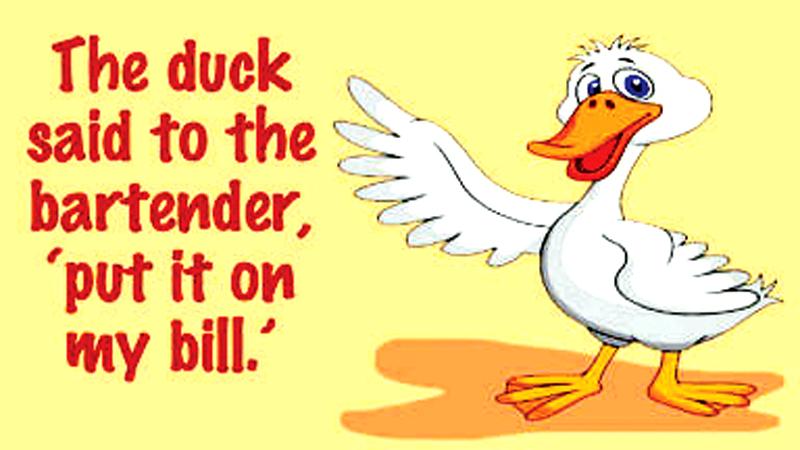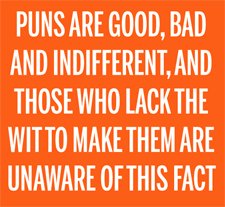
Pun is a play on words identical in sound or similar in sound, but are sharply diverse in meaning. Puns have had serious literary uses.
 William Shakespeare and other writers had used puns seriously for comic purposes. In “Romeo and Juliet”, Mercutio bleeding to death says grimly, “Ask for me tomorrow and you shall find me a grave man.” John Donne’s solemn “Hymn to God the Father” puns throughout on his own name and the verb “done.” In the 18th century and thereafter, however, the literary use of the pun has been almost exclusively comic. A great exception is James Joyce’s “Finnegans Wake” which exploits puns throughout to help sustain its complex effect, at one serious and comic, of multiple levels of meanings.
William Shakespeare and other writers had used puns seriously for comic purposes. In “Romeo and Juliet”, Mercutio bleeding to death says grimly, “Ask for me tomorrow and you shall find me a grave man.” John Donne’s solemn “Hymn to God the Father” puns throughout on his own name and the verb “done.” In the 18th century and thereafter, however, the literary use of the pun has been almost exclusively comic. A great exception is James Joyce’s “Finnegans Wake” which exploits puns throughout to help sustain its complex effect, at one serious and comic, of multiple levels of meanings.
The assumption that puns are per se contemptible, betrayed by the habit of describing every pun not as a pun, but as a bad pun or a feeble pun, is a sign at once of sheepish docility and desire to seem superior. Puns are good, bad and indifferent, and those who lack the wit to make them are unaware of this fact.
In a way, pun is a joke exploiting the different possible meanings of a word or the fact that there are words which sound alike, but have different meanings. Recorded from the mid-17th century, the word may be an abbreviation of obsolete ‘pundigrion,’ as a fanciful alteration of ‘punctilio’, a fine or pretty point of conduct or procedure.
Paronomasia
‘Paronomasia’ are puns, plays on words, making jocular or fanciful use of similarity between different words or of a word’s different senses. The best known of all is perhaps that of Matt. XVI. 18: Thou art Peter (Greek Petros), and upon this rock (Greek petra) I will build my church.
Now that we regard puns merely as exercises in jocularity and a pretty debased form even of that we are apt to be jarred by the readiness of Shakespeare’s characters to make them what seems to us most unsuitable moments, as Macbeth does just before the murder of Duncan and Lady Macbeth just after it. If the assassination could catch with his surcease success / If he do bleed, I’ll gild the faces of the grooms withal, for it must seem their guilt.
A special type of pun, known as the ‘equivoque’ is the use of a single word or phrase which has two disparate meanings, in a context which makes both meanings equally relevant. An example is the epitaph suggested for a bank teller: “He checked his cash, cashed in his checks, and left his widow. Who is next?”
Attempts at humour can be the downfall of the adventurous but incautious writer. Perhaps that is why there are very few writers able to make their readers laugh. Although newspapers will pay the earth for them, they still remain only a handful internationally.
Court before hearse
At a local racket club, you have to reserve a tennis court well in advance. An enthusiastic tennis player left early from his funeral in order to book a tennis court. Everybody said it was a case of putting the court before the hearse.
When several construction workers were killed in a building collapse in Bombay (Mumbai), India, the “Free Press Journal” ran a full seven-column headline on the front page: ‘Tons of soil over sons of toil.” The headline clicked despite its somewhat irreverent tone and disregard to the sanctity of human lives.
Asked to define the differences between men and women, Samuel Johnson replied, “I can’t conceive, madam, can you?” The great dictionary-maker was using a figure of speech known to classical rhetoricians as ‘paranomasia’, better known as a pun or play on words.
By the way, how does a pun operate? It reminds me of another word of similar or identical sound but of very different denotation.
Although puns at their worst can be mere piddling quibbles, at best, they can sharply point to surprising but genuine resemblances. The name of a dentist’s country estate “Tooth Acres” is accurate: aching teeth paid for the land. In poetry, a pun may be facetious, as in Thomas Hood’s ballad of “Faithless Welly Gray”:
Ben Battle was a soldier bold,
And used to war’s alarms;
But a cannon-ball took off his legs,
So he laid down his arms!
Thomas Hood also wrote
another poem full of puns:
His death, which happen’d in
his berth,
A forty-odd befell;
They went and told the sexton, and
The sexton toll’d the bell.
Oliver Herford’s poem is highly creative:
My sense of sight is very Keen,
My sense of hearing weak.
One time I saw a mountain pass,
But could not hear its peak.
It is a fascinating hobby to collect puns. However, you do not come across many puns in modern books. Schoolchildren make puns when they write essays.
Gyles Brandreth in his “Word Play” has listed some of the puns found in schools essays in England. The authors were students who did not know that they were creating puns for the enjoyment of their teachers. Here are some of them:
• Drake circumcised the world in a small ship.
• Oedipus complex was a famous queen of Egypt.
• Telepathy is a code invented by Morse.
• Livid was a famous Latin poet.
• In the spring the lambs can be seen gambling in the field.
• The inhabitants of Paris are called Parasites.
• Barristers are pieces of wood, generally at the side of the stairs.
• Psychology is a fairly modern disease invented by a man called Floyd.
• Homer wrote the Oddity.
• Socrates died from an overdose of wedlock.
• When a man has more than one wife he is a pigamist.
Puns have enriched English literature. Once in a way, local newspapers make puns. Britain’s Sun newspaper is renowned for its front page headlines. The daily tabloid’s best known puns include the following:
• Obama Lama ding Dong (President Obama meets the Dalai Lama)
• It’s Paddy Pantsdown (Paddy Ashdown, former leader of the Liberal Democratic Party, admits to an affair)
